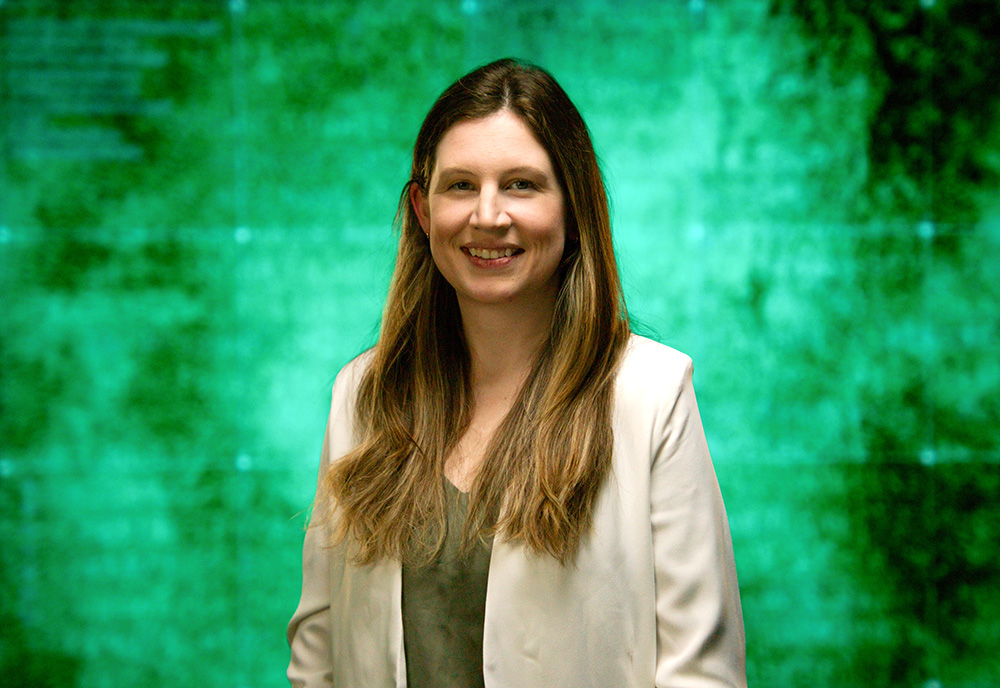Lauren Smith is passionate about curbing cybercrime, a field that is constantly changing as criminals find new ways to take advantage of emerging technologies.
That passion led her to pivot from a pre-veterinary college track to one in criminology and, most recently, USF’s fully online Master of Science in Cybercrime program. She says the combination of expert faculty, flexible learning, and industry-relevant content has sparked an exciting career — she is a training manager whose work focuses on cryptocurrency crime.
DISCOVERING HER PATH
While finishing her bachelor’s degree, she completed several internships, including one as a crime scene analyst at the Hillsborough County Sheriff’s Office. This expanded her perspective of the field. It also helped her realize that she wanted to dive into the tech side of things. That’s when she landed a role as an anti-money laundering analyst at Citibank, a multinational banking and financial services giant.
“I’m good with Excel and numbers, so I started applying to analyst positions when I graduated and found my niche with anti-money laundering,” she said. “Because of the Patriot Act, the job field was booming.”
From there, she moved around between a few roles, gaining more experience in the banking industry with each step.
FINDING HER PASSION IN CRYPTOCURRENCY
In 2020, Smith decided to shake things up and move to Atlanta from Florida to live closer to her parents. Once settled in the Peach State, she landed a job as a training specialist at Chainalysis, a blockchain data platform. As a training specialist, Smith’s primary role was to teach law enforcement, and public and private sector government employees how to investigate crime involving cryptocurrency.
Bitcoin, Ethereum, and other popular cryptocurrencies use blockchain to process and record transactions securely. While blockchains record transactions and the funds are no more or less secure than traditional ones, criminals can exploit the anonymity of digital currencies. This means financial firms must not only prevent crime but also work to prosecute it. That’s where Smith comes in. She is training people on how to investigate such crimes. She has trained more than 750 people in the last year.
For Smith, one major benefit of working at Chainalysis was the opportunity to use its education stipend.
“A few professors that I’m still in touch with from my bachelor’s degree recommended checking into the cybercrime program, and my company was willing to help pay for it, so all the stars aligned,” she said.
Though she just completed the program last month, earning a degree in cybercrime has already opened doors for Smith. She was recently promoted to a manager role at Chainalysis and now oversees a team of training specialists. She is still teaching law enforcement and government employees how to investigate cryptocurrency crimes, too.
A RELEVANT, FLEXIBLE LEARNING EXPERIENCE
Smith says the online experience at USF has been exceptional. Classes were well planned; the program was laid out well. It offered a seamless and professionally relevant learning experience tailored to working professionals, she said.
Soon after beginning the program, Smith discovered she was pregnant with her daughter.
From going into labor during finals week to emergencies that arose due to COVID, she found the faculty’s commitment to student success ensured that she had the support she needed during such pivotal moments in her life. The combination of their commitment to students and their exceptional backgrounds is one of the things that stands out to Smith.
“The professors were all very helpful, available, and had impressive backgrounds,” she said. “I also appreciated that they all had real-world experience in the field.”
Smith also enjoyed the camaraderie that developed between her and classmates. Since most of her peers were in a similar career stage, it was easy to relate to and form connections with each other.
“We had some insightful discussions about what we were learning,” Smith said. “Interacting through the weekly discussion boards and peer review assignments helped foster a sense of community among our cohort.”
Smith credits the coursework in analysis and digital investigations with enhancing her ability to teach cryptocurrency crime investigations.
In addition to her promotion, Smith has also noticed benefits to her professional life on a broader scale.
“I’ve been asked to do several speaking occasions for things outside of work, so earning the master’s in cybercrime has offered me a lot of extra opportunities,” she said.
Overall, she feels that having her master’s helps show the world that she’s truly invested in her career.
In the future, she plans to continue growing with her organization. She hopes to become an adjunct professor to help others learn about cybercrime. She envisions helping students gain the practical skills to address evolving challenges in cryptocurrency crime investigations.
Smith’s ambition to become an adjunct professor and mentor the next generation of cybercrime experts speaks to the program’s enduring value, equipping her not only to succeed but to inspire others.
Learn more about how USF’s M.S. in Cybercrime program can lead to an opportunity-filled career in this growing field by visiting the website.
